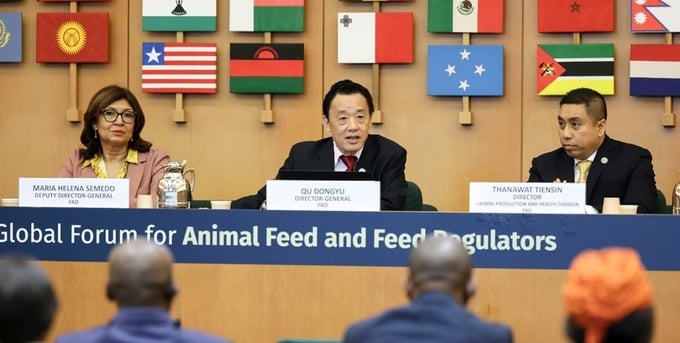June 21, 2025 | 02:38 GMT +7
June 21, 2025 | 02:38 GMT +7
Hotline: 0913.378.918
June 21, 2025 | 02:38 GMT +7
Hotline: 0913.378.918

FAO Director-General QU Dongyu addresses the Global Forum. On left: Deputy Director-General Maria Helena Semedo; on right: Thanawat Tiensin, Director of FAO's Animal Production and Health Division.
Scores of international experts, including government officials, researchers and industry leaders from several continents, gathered at the Food and Agriculture Organization of the United Nations (FAO). Headquarters in Rome for the two-day Global Forum for Animal Feed and Feed Regulators.
The Forum focuses on a sector that generates more than $400 billion in annual commercial turnover and produces more than one billion tons of livestock feed, a key input for animal health, human nutrition and environmental sustainability.
The livestock sector must transform along with other elements of global agrifood systems to be more efficient, more inclusive, more resilient, and more sustainable, to the benefit of people and the planet, FAO Director-General QU Dongyu said in opening remarks at the Forum.
A critical pathway is ensuring the availability, accessibility, quality and safety of animal feed, which will require concrete actions ranging from the management and restoration of grasslands and pastures to the production of fodder and feed ingredients and the processing and use of compound feed, all of which will require appropriate policies and regulations, he added. “Feeding animals well will feed the world better,” Qu said.
The Global Forum is organized to offer an inclusive discussion platform for national and regional feed regulatory competent authorities, FAO Members, private sector, researchers, development agencies, financial institutions and civil society. Case studies offer all participants the opportunity to explore cutting-edge innovations and strategies to enhance the production of high quality, safe and environmentally responsible animal feed.
Demand for animal protein, particularly poultry and pork, is increasing due to population growth, urbanization and improved purchasing power in emerging economies. Meeting that growing demand requires emphasizing environmental concerns, socio-economic considerations and an array of safety issues affecting both animals and humans. Ensuring adequate animal nutrition reduces the need for antimicrobials, thus contributing to contain Antimicrobial Resistance (AMR).
While livestock feed value chains vary enormously around the planet, it is crucial that small and medium-scale farmers, who make up most of the livestock producers worldwide, are provided with cost-efficient and science-based feed solutions and “access to knowledge, technology, and markets, to improve their livelihoods, contribute to poverty reduction, and accelerate rural development,” the Director-General said.
Executives from trade groups such as the International Feed Industry Federation (IFIF), scientists and policy experts from Brazil, Ghana, Mexico, Morocco, the Netherlands, Nigeria, Uganda and the United States of America among other countries, and representatives of regional pastoralist networks from around Africa, will speak on the Global Forum. They are expected to address topics ranging from ensuring feed availability to developing and implementing related legislation optimizing feed ingredients for desired health, quality and environmental outcomes.
FAO experts offered insights into the Organization’s work on the Sustainable Livestock Transformation Initiative, animal nutrition and feed safety, alternative and advanced feed practices to reduce the need of antimicrobials, and normative work on food standards set out in the Codex Alimentarius. Takeaways from the Global Conference on Sustainable Livestock Transformation held at FAO in September were also discussed.
Shifting gears to action
“We already know many of the solutions,” the Director-General told participants.Feed typically constitutes between 60 percent and 80 percent of livestock production costs. Globally, commercial production or sale of feed takes place in more than 130 countries and some 8 000 plants turn out more than 600 million tonnes of feed annually.
Another 300 million comes from on-farm production.Improving feeding with balanced rations and the efficient use of locally-available feed resources can significantly boost profitability. The feed industry could contribute to the bioeconomy by increasing the use of by-products and residues from food processing and other stages of agrifood systems value chains.
And with 40 percent of global arable land used to feed livestock, there is a major opportunity to improve the sustainability of agrifood systems by optimizing land use.
(FAO.org)

(VAN) Poultry production in Poland, which has only started recovering from devastating bird flu outbreaks earlier this year, has been hit by a series of outbreaks of Newcastle disease, with the veterinary situation deteriorating rapidly.

(VAN) Extensive licensing requirements raise concerns about intellectual property theft.

(VAN) As of Friday, a salmonella outbreak linked to a California egg producer had sickened at least 79 people. Of the infected people, 21 hospitalizations were reported, U.S. health officials said.

(VAN) With the war ongoing, many Ukrainian farmers and rural farming families face limited access to their land due to mines and lack the financial resources to purchase needed agricultural inputs.

(VAN) Vikas Rambal has quietly built a $5 billion business empire in manufacturing, property and solar, and catapulted onto the Rich List.

(VAN) Available cropland now at less than five percent, according to latest geospatial assessment from FAO and UNOSAT.

(VAN) Alt Carbon has raised $12 million in a seed round as it plans to scale its carbon dioxide removal work in the South Asian nation.